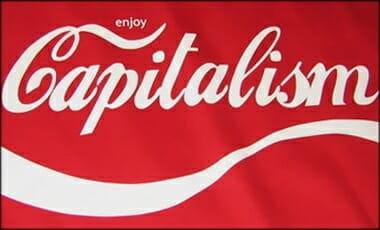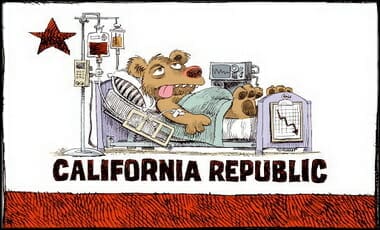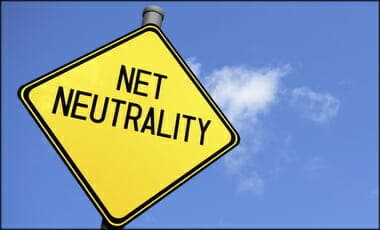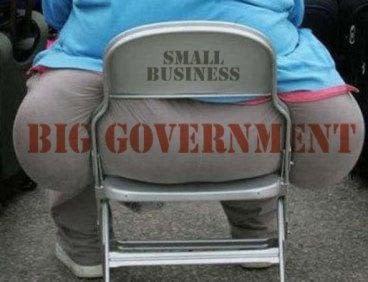Competition makes entertainment better and cheaper.

Competition makes entertainment better and cheaper.

The chair of Black Lives Matter for Greater New York said recently on Fox News, “If the country doesn’t give us what we want, then we will burn down this system.” He said he could be speaking figuratively or literally, saying “it’s a matter of interpretation.” To help assess these statements, Larry Elder takes a look at some of the demands from the group.

(See PRAGER U’s PLAYLIST) Here is an excerpt that the above video compliments.
It is a hallmark of socialist governments everywhere to nationalize heavy industries like petroleum, and, in the process, turn them into government-supervised environmental criminals unaccountable to property owners and consumers. For example, when privately owned British Petroleum (BP) caused an accidental oil spill in the Gulf of Mexico, it immediately established a $20 billion fund to pay future claims of damages and did everything it could to clean up the mess. It had legal obligations and its corporate reputation at stake. When the Mexican government’s oil company, Pemex, causes an oil spill in the Gulf of Mexico—and there have been many—it claims “sovereign immunity” from any legal damages. In the first five months of 2015, Pemex was responsible for three catastrophic oil rig explosions in the Gulf of Mexico that caused several deaths, numerous injuries to oil platform workers, and generated air and water pollution. Pemex claimed that the explosions caused no oil spill, but satellite images taken by Greenpeace Mexico showed a two-and-a-half-mile long oil slick reaching from the exploded oil platform. “Pemex has proven time and time again that you cannot trust their statements,” said Gustavo Ampugnani of Greenpeace Mexico.
The United States is not immune from socialist-d riven environmental problems. Many utility companies, for example, are government-owned with less than stellar results. In 2015, to take just one recent example, the people of Flint, Michigan, were alerted to a fright-cuing environmental debacle. The city government, supposedly in an effort to save money, switched its city’s water supply from Lake Huron to the Flint River, despite the fact that the Flint River had long been known to be extraordinarily polluted. The Flint city government (and the state’s Department of Environmental Quality, according to a class action lawsuit) failed to properly treat water from the Flint River. The result was that city residents drank and bathed in water full of lead and other dangerous chemicals.
For many intellectuals, the attraction of socialism is that it is “rational”; it is a “planned” economy, planned by people like them. In reality, the environmental and economic results of socialism are a litany of disaster.
Thomas J. DiLorenzo, The Problem with Socialism (New Jersey, NJ: Regnery, 2016), 120-121.

I wanted to share two articles to exemplify and introduction to a HERITAGE FOUNDATION article about competition between states. The first is this article found over at HOT AIR, and it shows the damage that distortions to supply and demand for some sort of egalitarian or environmental concern can have on productive endeavors that increase the wealth of the common man. Wealth creation in other words:
If you know anything about New York in the modern era (both the state and the Big Apple), you’re likely aware that it’s not exactly a friendly landscape for the oil and gas industry. The “Keep it in the ground” crowd has a lot of influence with the Democrats who control the government. That[‘s] why, back in 2013, when the new Constitution Pipeline was proposed to carry natural gas from Pennsylvania’s rich shale oil fields to New York, activists were able to block the construction despite it already having been approved by federal regulators. Similarly, when National Grid (the local energy consortium) requested an extension to the Williams Co. Transco pipeline, they were also tied up because of the outcry from environmental activists.
Here comes the surprise that nobody could have possibly seen coming. The city and its surrounding downstate region are still expanding with new construction projects, but their energy suppliers have told them that they will not be able to supply natural gas to any new customers because they’re already at capacity. (NY Post)
Long Islanders were recently hit with bad news. National Grid, which provides natural gas for nearly 600,000 Long Island residents, announced it won’t be able to provide fuel for new customers if the proposed Williams Co. Transco pipeline expansion isn’t approved by May 15.
Earlier this year, energy company Con Ed imposed a similar moratorium on new natural-gas service in parts of Westchester County due to limited capacity on existing pipelines. These crises are completely avoidable…
For too long, politicians like Gov. Andrew Cuomo and their ill-considered energy policies have hampered the development of safe, efficient energy infrastructure, subjecting American consumers to unnecessarily high energy costs and unreliable service.
So you don’t want pipelines, eh? But you say you’d like to build more houses, apartments and office buildings? Well, you’d better figure out how to cook your food and heat your living spaces with solar panels pretty quickly because (to borrow a phrase from GoT) winter is coming. And so is lunchtime…..
The second article deals with on the one hand a Utopian [mis]understanding of alternative energy and it’s own “supply-and-demand” features built into the environmentalist hypothesis (that in the end do not fit reality). I have said for years that the supply of heavy metals and lithium which are the main ingredient to make power cells for cell phones and laptops (small/reasonable), to a whole swath of them in rows in electric cars (unreasonable).
Let me explain why I just said “unreasonable.” These ventures with Tesla and other manufacturers of electric vehicles are not a “supply-and-demand” by the free market. These ventures into wind, solar, and electric vehicles ONLY EXIST because our government has funded their “viability” in a world that if left to stand on their own would go out of business. The technology is old and never really worked, and the only people that buy Teslas, as an example, are the rich, and they are given a form of welfare to do so. (In other words, the rich are getting a form of bailout by environmentalists that say the rich are ruining the environment.)
Here is POWERLINE’S article in part:
“Green” advocates aspire to power the entire U.S. electrical system with wind and solar energy. How are they going to do that, given that wind turbines produce electricity only around 40% of the time, and solar panels produce electricity, in most areas, less than 25% of the time? The truthful answer is that whenever utilities build (or contract with) a wind farm or a solar installation, they also build a natural gas plant to provide electricity during the majority of the time when the “green” resources are idle. This is why wind and solar energy, unlike nuclear power, actually lock us into fossil fuel use for the indefinite future.
Of course, green power advocates don’t admit that they plan on using natural gas forever. They hold out hope that electricity produced by wind and solar facilities will be stored in batteries–giant ones, I assume–so that it can be used when the wind doesn’t blow and the sun doesn’t shine. No such batteries exist, of course, which is why they are not already in use. And any existing or foreseeable battery technology would rely on vast amounts of lithium, which must be mined.
Currently, the Chinese are “rush[ing] to dominate the global supply of lithium.” We do have lithium deposits in the United States, notably in the Panamint Valley of California. The Los Angeles Times reports: “A war is brewing over lithium mining at the edge of Death Valley.”
Recently, the Australia-based firm Battery Mineral Resources Ltd. asked the federal government for permission to drill four exploratory wells to see if the hot, salty brine beneath the valley floor contains economically viable concentrations of lithium. …
The drilling request has generated strong opposition from the Center for Biological Diversity, the Sierra Club and the Defenders of Wildlife, who say the drilling project would be an initial step toward the creation of a full-scale lithium mining operation.
That is the idea, I suppose.
[….]
Does it matter? There is great demand for lithium used in existing technologies–phones, laptops, electric vehicles, and so on. But the idea that batteries of any foreseeable design will combine with wind turbines and solar panels to satisfy America’s need for electricity is a fantasy. For one thing, batteries of the requisite capacity would be prohibitively expensive. It has been calculated that, using the most advanced battery technology on the market, Tesla’s 100 MW, 129 MWh battery in use in South Australia, it would cost $133 billion to store the electricity needs of my state, Minnesota, for 24 hours. That is more than one-third of the state’s annual GDP…..
AGAIN, the immutable law of supply-and-demand will come into play in rising prices of “alternative energy” and scarcity of availability… based on egalitarian environmental concerns. N O W, here is the intro to the HERITAGE FOUNDATION article noting the differences between blue-state policies and red-state policies… much of which is based on supply-and-demand regarding energy needs:
N O W, here is the intro to the HERITAGE FOUNDATION article noting the differences between blue-state policies and red-state policies… much of which is based on supply-and-demand regarding energy needs:
The competition among the states is becoming more intense as businesses become more mobile. Toyota and Boeing are two high-profile employers in America that have crossed state borders because of the policy advantages of one state over another. Toyota moved from high-income-tax California to no-income-tax Texas, and Boeing, based in Washington, a forced-union state, opened a new plant in South Carolina, which has a right-to-work (RTW) law. Texas Governor Rick Perry and California Governor Jerry Brown have openly sparred in recent years about which state is more pro-business. Interstate competition allows governors and legislators to learn from each other about which policies create wealth and which policies diminish wealth inside their borders.
In recent years, governors have generally divided into two competing camps, which we call the “red state model” and the “blue state model,” raising the stakes in this interstate competition. The conservative red state model is predicated on low tax rates, right-to-work laws, light regulation, and pro-energy development policies. This policy strategy is now common in most of the Southern states and the more rural and mountain states. Meanwhile, the liberal blue state model is predominantly found in the Northeast, California, Illinois, Minnesota, and, until recently, Michigan and Ohio. The blue states have doubled down on policies that include high levels of government spending, high income tax rates on the rich, generous welfare benefits, forced-union requirements, super-minimum-wage laws, and restrictions on oil and gas drilling.
In no area are the effects of these competing models more evident than in tax policy changes of recent years. California, Connecticut, Hawaii, Illinois, Minnesota, New York, and Oregon have raised their income tax rates on “the rich” since 2008.[1] In four of these states, the combined state and local income tax rate exceeds 10 percent, reaching 13.3 percent in California and 12.7 percent in New York.[2] Meanwhile, the “red states” of Arizona, Arkansas,[3] Kansas,[4] Missouri,[5] North Carolina, Oklahoma, and Idaho[6] have cut their tax rates. This has widened the income tax differential between blue states and red states for businesses and upper-income families.
Similarly, red states such as Oklahoma, Texas, and North Dakota have embraced the oil and gas drilling revolution in America. Blue states such as New York, Vermont, Illinois, and California have resisted it. Blue states have raised their minimum wages; red states generally have not.
In this study, which is a summary of our recent book with Rex Sinquefield and Travis Brown, An Inquiry into the Nature and Causes of the Wealth of States: How Taxes, Energy, and Worker Freedom Will Change the Balance of Power Among States, we examine whether these policy differentials matter and, if so, by how much.
The answer is that the states’ policy choices on taxes, regulation, energy policy, labor laws, educational choice, and so forth have a large and in most cases a statistically significant impact on the prosperity of states over each 10-year time frame examined on a rolling basis from 1970 to 2012. There are always exceptions to the rule, but in most cases the red state model is substantially outperforming the blue state model.
We find in particular that two policies matter most. Right-to-work states substantially outperform non–right-to-work states, and states with no or low income taxes have a much better economic record than high-income-tax states…..

Decades after capitalism seemed to have triumphed over socialism, politicians are once again arguing about the merits and drawbacks of these opposing economic systems. Why are we still having this debate? Andy Puzder, former CEO of the parent company of Hardee’s and Carl’s Jr., explains the misconceptions that keep the debate alive.

Larry Elder discusses two paths to Bullet Trains with Professor of Economics, University of California, Los Angeles and Senior Fellow, Hoover Institution, Stanford University — Lee Ohanian. Dr. Ohanian catches us up with the latest regarding Trump’s economy as well. I haven’t done audio of the sage for a while (job change), but it is good to catch up with this run. Here is the professors article on the trains:

(Originally posted February 2011)
Here is a great quote from Dr. Grudem:
A. PRIVATE PROPERTY
According to the teachings of the Bible, government should both document and protect the ownership of private property in a nation.
The Bible regularly assumes and reinforces a system in which property belongs to individuals, not to the government or to society as a whole.
We see this implied in the Ten Commandments, for example, because the eighth commandment, “You shall not steal” (Exod. 20:15), assumes that human beings will own property that belongs to them individually and not to other people. I should not steal my neighbor’s ox or donkey because it belongs to my neighbor, not to me and not to anyone else.
The tenth commandment makes this more explicit when it prohibits not just stealing but also desiring to steal what belongs to my neighbor:
“You shall not covet your neighbor’s house; you shall not covet your neighbor’s wife, or his male servant, or his female servant, or his ox, or his donkey, or anything that is your neighbor’s” (Exod. 20:17).
The reason I should not “covet” my neighbor’s house or anything else is that these things belong to my neighbor, not to me and not to the community or the nation.
This assumption of private ownership of property, found in this fundamental moral code of the Bible, puts the Bible in direct opposition to the communist system advocated by Karl Marx. Marx said:
The theory of the Communists may be summed up in the single sentence: abolition of private property.
One reason why communism is so incredibly dehumanizing is that when private property is abolished, government controls all economic activity. And when government controls all economic activity, it controls what you can buy, where you will live, and what job you will have (and therefore what job you are allowed to train for, and where you go to school), and how much you will earn. It essentially controls all of life, and human liberty is destroyed. Communism enslaves people and destroys human freedom of choice. The entire nation becomes one huge prison. For this reason, it seems to me that communism is the most dehumanizing economic system ever invented by man.
Other passages of Scripture also support the idea that property should belong to individuals, not to “society” or to the government (except for certain property required for proper government purposes, such as government offices, military bases, and streets and highways). The Bible contains many laws concerning punishments for stealing and appropriate restitution for damage of another person’s farm animals or agricultural fields (for example, see Exod. 21:28-36; 22:1-15; Deut. 22:1-4; 23:24-25). Another commandment guaranteed that property boundaries would be protected: “You shall not move your neighbor’s landmark, which the men of old have set, in the inheritance that you will hold in the land that the LORD your God is giving you to possess” (Deut. 19:14). To move the landmark was to move the boundaries of the land and thus to steal land that belonged to one’s neighbor (compare Prov. 22:28; 23:10).
Another guarantee of the ownership of private property was the fact that, even if property was sold to someone else, in the Year of Jubilee it had to return to the family that originally owned it:
It shall be a Jubilee for you, when each of you shall return to his property and each of you shall return to his clan (Lev. 25:10).
This is why the land could not be sold forever: “The land shall not be sold in perpetuity, for the land is mine. For you are strangers and sojourners with me” (Lev. 25:23).
This last verse emphasizes the fact that private property is never viewed in the Bible as an absolute right, because all that people have is ultimately given to them by God, and people are viewed as God’s “stewards” to manage what he has entrusted to their care.
The earth is the LORD’S and the fullness thereof, the world and those who dwell therein (Ps. 24:1; compare Ps. 50:10-12; Hag. 2:8).
Yet the fact remains that, under the overall sovereign lordship of God himself, property is regularly said to belong to individuals, not to the government and not to “society” or the nation as a whole.
When Samuel warned the people about the evils that would be imposed upon them by a king, he emphasized the fact that the monarch, with so much government power, would “take” and “take” and “take” from the people and confiscate things for his own use:
So Samuel told all the words of the LORD to the people who were asking for a king from him. He said, “These will be the ways of the king who will reign over you: he will take your sons and appoint them to his chariots and to be his horsemen and to run before his chariots. And he will appoint for himself commanders of thousands and commanders of fifties, and some to plow his ground and to reap his harvest, and to make his implements of war and the equipment of his chariots. He will take your daughters to be perfumers and cooks and bakers. He will take the best of your fields and vineyards and olive orchards and give them to his servants. He will take the tenth of your grain and of your vineyards and give it to his officers and to his servants. He will take your male servants and female servants and the best of your young men and your donkeys, and put them to his work. He will take the tenth of your flocks, and you shall be his slaves. And in that day you will cry out because of your king, whom you have chosen for yourselves, but the LORD will not answer you in that day” (1 Sam. 8:10-18).
This prediction was tragically fulfilled in the story of the theft of the vineyard of Naboth the Jezreelite by Ahab the wicked king and Jezebel, his even more wicked queen (see 1 Kings 21:1-29). The regular tendency of human governments is to seek to take control of more and more of the property of a nation that God intends to be owned and controlled by private individuals.
SOCIALISM likewise is the taking over of private property, industry, and the capital of a man’s labor. Here is a good working definition of socialism followed by Professor Richards describing it as well:
In order to have a “favorable” view of socialism one must have either forgotten what the entire world learned about socialism from the late nineteenth century on, or have never learned anything about it in the first place. The latter is obviously true of much of the younger generation.
Socialism started out being defined as “government ownership of the means of production,” which is why the government of the Soviet Union confiscated all businesses, factories, and farms, murdering millions of dissenters and resisters in the process. It is also why socialist political parties in Europe, once in power, nationalized as many of the major industries (steel, automobiles, coal mines, electricity, telephone services) as they could. The Labour Party in post-World War II Great Britain would be an example of this. All of this was done, ostensibly, in the name of pursuing material “equality.”
In the foreword to the 1976 edition of his famous book, The Road to Serfdom, Nobel laureate economist Friedrich Hayek wrote that the definition of “socialism” evolved in the twentieth century to mean income redistribution in pursuit of “equality,” not through government ownership of the means of production but through the institutions of the welfare state and the “progressive” income tax. The means may have changed, but the ostensible end—equality—remained the same.
Hayek’s mentor, fellow Austrian economist Ludwig von Mises, explained in his classic treatise Socialism: An Economic and Sociological Analysis, that the welfare state, the “progressive” income tax, and especially pervasive government regulation of business were all tools of “destructionism” in the eyes of the socialists of his day. That is, he observed that the proponents of socialism always employed a two-pronged approach: (1) the government takeover of as many industries and as much land as possible, and (2) attempts to destroy existing capitalist societies with onerous taxes, regulations, the welfare state, inflation, or whatever they thought could get the job done.
Thomas J. DiLorenzo, The Problem with Socialism (New Jersey, NJ: Regnery, 2016), 4-5.

Here Dennis Prager discusses a recent poll showing that Democrat are in LOVE with socialism. USA TODAY notes the following about the poll:
…According to a Gallup poll published Monday, a majority of Democrats no longer hold a positive view of capitalism, while nearly 60 percent of them feel good about socialism. More than 70 percent of Republicans, on the other hand, see capitalism positively, while only 16 percent of them have a positive view of socialism.
The positive view of socialism among Democrats, and those who lean Democrat, actually dropped a point from 58 percent in 2016. But in those same two years, positive feelings about capitalism plummetted from 56 to 47 percent…
At one point Prager notes that socialism hasn’t made one dime in money… which made me think of this quote from an excellent book:
Thomas J. DiLorenzo, The Problem with Socialism (New Jersey, NJ: Regnery, 2016), 79.

I will first post this popular question during the Q&A of the below linked lecture. (Just a note, while I am not on board for a fully idealized “Ayn Rand Objectivism,” but many aspects are just true.) Very important:
(FULL VERSION of Dr. Yaron Brook, president of the Ayn Rand Institute arguing that “Equal is Unfair – The Inequality Advantage” at The University of Exeter.) The following is more of Dr. Brook’s responses during Q&A:

Rush does a good job in explaining the countering info to all the scare tactics of the Left about “net neutrality.”

Here is a comment via my LIVELEAK [now defunct] (rough language warning):
Pai is right. The neutrality storm is being shilled up by the content providers that are scared they will have to actually start paying market rates for their access. The loudest is Netflix, and anybody with at least two brain cells (and a functioning ability to give a shit) know that’s the bunch that melted down a lot of peering among the major networks while screaming for those same networks to increase Netflix’s transit capacity for free. They stir the ignorant masses up with bullshit about ‘equal access’ while their data accounts for up to 70% of the total internet bandwidth demand and 90/10 asymmetrical peering transits. They talked the weak Obama administration into legislation to favor their business, calling it “Net Neutrality” and are now pissed they are about to lose that favoritism.
The stupid sheep are screaming that ISPs will fuck them over with fees and blocked content while the fat cat content providers sit back and grin at how easy it is to manipulate their minions. The internet was created and ran just fine for twenty years before the unnecessary Obama “Net Neutrality” doctrine. The doomsday claims of the NN bunch are belied by the facts.
Wanted to get this portion of an important article here — via THE MISES INSTITUTE:
The Natural-Monopoly Myth: Telephone Services
The biggest myth of all in this regard is the notion that telephone service is a natural monopoly. Economists have taught generations of students that telephone service is a “classic” example of market failure and that government regulation in the “public interest” was necessary. But as Adam D. Thierer recently proved, there is nothing at all “natural” about the telephone monopoly enjoyed by AT&T for so many decades; it was purely a creation of government intervention.”54
Once AT&T’s initial patents expired in 1893, dozens of competitors sprung up. “By the end of 1894 over 80 new independent competitors had already grabbed 5 percent of total market share … after the turn of the century, over 3,000 competitors existed.55 In some states there were over 200 telephone companies operating simultaneously. By 1907, AT&T’s competitors had captured 51 percent of the telephone market and prices were being driven sharply down by the competition. Moreover, there was no evidence of economies of scale, and entry barriers were obviously almost nonexistent, contrary to the standard account of the theory of natural monopoly as applied to the telephone industry.56
The eventual creation of the telephone monopoly was the result of a conspiracy between AT&T and politicians who wanted to offer “universal telephone service” as a pork-barrel entitlement to their constituents. Politicians began denouncing competition as “duplicative,” “destructive,” and “wasteful,” and various economists were paid to attend congressional hearings in which they somberly declared telephony a natural monopoly. “There is nothing to be gained by competition in the local telephone business,” one congressional hearing concluded.57
The crusade to create a monopolistic telephone industry by government fiat finally succeeded when the federal government used World War I as an excuse to nationalize the industry in 1918. AT&T still operated its phone system, but it was controlled by a government commission headed by the postmaster general. Like so many other instances of government regulation, AT&T quickly “captured” the regulators and used the regulatory apparatus to eliminate its competitors. “By 1925 not only had virtually every state established strict rate regulation guidelines, but local telephone competition was either discouraged or explicitly prohibited within many of those jurisdictions.”58
Conclusions
The theory of natural monopoly is an economic fiction. No such thing as a “natural” monopoly has ever existed. The history of the so-called public utility concept is that the late 19th and early 20th century “utilities” competed vigorously and, like all other industries, they did not like competition. They first secured government-sanctioned monopolies, and then, with the help of a few influential economists, constructed an expost rationalization for their monopoly power.
This has to be one of the greatest corporate public relations coups of all time. “By a soothing process of rationalization,” wrote Horace M. Gray more than 50 years ago, “men are able to oppose monopolies in general but to approve certain types of monopolies. … Since these monopolies were ‘natural’ and since nature is beneficent, it followed that they were ‘good’ monopolies. … Government was therefore justified in establishing ‘good’ monopolies.”59
In industry after industry, the natural monopoly concept is finally eroding. Electric power, cable TV, telephone services, and the mail, are all on the verge of being deregulated, either legislatively or de facto, due to technological change. Introduced in the United States at about the same time communism was introduced to the former Soviet Union, franchise monopolies are about to become just as defunct. Like all monopolists, they will use every last resource to lobby to maintain their monopolistic privileges, but the potential gains to consumers of free markets are too great to justify them. The theory of natural monopoly is a 19th century economic fiction that defends 19th century (or 18th century, in the case of the US Postal Service) monopolistic privileges, and has no useful place in the 21st century American economy.
Let me caveat this next excerpt by saying I am NOT a fan of the New American Magazine. They are a John Birch publication, and my understanding of this organization is intimate, and so are my ultimate rejection of many of it’s positions. THAT BEING SAID, I thoroughly enjoyed this article (minus the NWO crap!) — THE BREAKUP OF MA BELL:
….Alexander Graham Bell patented the telephone on March 7, 1876, but initially it was considered no more than a passing novelty. In fact, Western Union passed up the opportunity to purchase the Bell patents for $100,000. But when those patents held by American Telephone and Telegraph Company expired in 1894, competition entered the market and the availability of telephone service and the number of telephones exploded. The telephone moved from novelty to necessity. According to Adam Thierer of the Cato Institute, there were, at the time, more than 3,000 telephone companies vying for customers. Author G. W. Brock, in his book The Telecommunications Industry, pointed out the difference competition made:
After seventeen years of monopoly [thanks to the patents held by AT&T from 1877 – 1894], the United States had a limited telephone system of 270,000 phones [mostly concentrated] in the centers of the cities, with service generally unavailable in the outlying areas. After thirteen years of competition [1907], the United States had an extensive system of six million telephones, almost evenly divided between Bell and [its competitors], with service available practically anywhere in the country. [Emphasis added.]
Writing in The New Telecommunications Industry, authors Leonard Hyman, Richard Toole, and Rosemary Avellis concluded that “competition helped to expand the market, bring down costs, and lower prices to consumers.” Because of the negative impact upon AT&T by its competitors, the president of AT&T, Theodore Newton Vail, changed the focus of the company from competition to consolidation. As noted by Thierer, “Vail’s most important goals upon taking over AT&T were the elimination of competitors, the befriending of policymakers and regulators, and the expansion of telephone service to the general public.” Vail’s belief in the superiority of a single monopolistic system was reflected in the company’s new corporate slogan, “One Policy, One System, Universal Service.” In the company’s 1910 annual report, Vail wrote:
Author R.H.K. Vietor, writing in Contrived Competition, said, “Vail chose at this time to put AT&T squarely behind government regulation, as the quid pro quo for avoiding competition. This was the only politically acceptable way for AT&T to monopolize telephony.” In fact, without government regulations eliminating the competition, the reinstitution of the AT&T monopoly would have been impossible. The Kingsbury Commitment (named for one of Vail’s employees) was an agreement with the Attorney General and the Interstate Commerce Commission in 1913 that essentially codified the playing field which allowed AT&T to regain monopoly control of the industry.
In 1934, the power to regulate the telephone industry under the ICC was transferred to the new Federal Communications Commission. Enacted by the Roosevelt Revolution during the Great Depression, the Communications Act of 1934 created the FCC “for the purpose of regulating interstate and foreign commerce in communication by wire and radio so as to make available, so far as possible, to all the people of the United States a rapid, efficient, nation-wide, and world-wide wire and radio communication service with adequate facilities at reasonable charges.” In other words, according to Thierer, “every American was henceforth found to be entitled to the right to telephone service, specifically cheap telephone service.” The FCC’s powers included the power to regulate rates and restrict entry by competitors, all in the name of preventing “wasteful duplication” and “unneeded competition.”…..
For months, it seemed nearly every media figure was in hysterics over the impending repeal of net neutrality. Then, net neutrality was repealed… and nothing much changed. So what exactly is net neutrality, and why do so many people have such strong opinions about something they don’t understand? Jon Gabriel, editor-in-chief of Ricochet.com cuts through the hysteria to bring you the facts.
MORE

Do you use an iPhone? Watch Netflix? Listen to Spotify? Then you love capitalism and can’t stand big government. How do we know? Jared Meyer of the Foundation for Government Accountability explains.